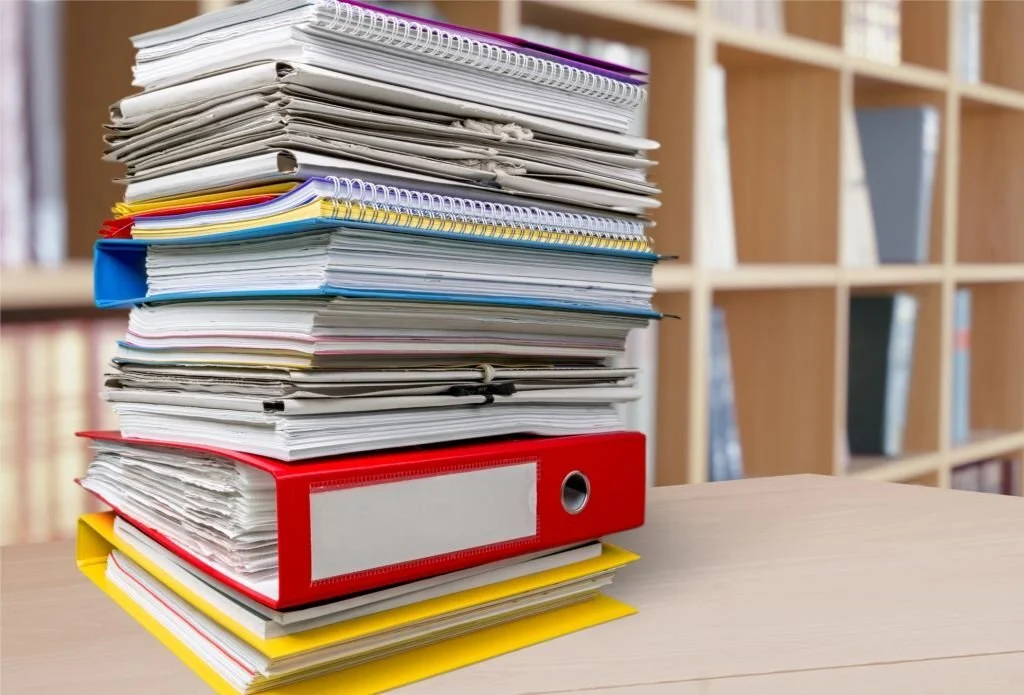Organizing your family’s essential documents, such as financials and personal identification, can save time, reduce stress, and provide peace of mind during emergencies.
Keep reading to learn about the must-have documents every family should gather, secure storage options, and tips for effective document management.
Key Takeaways
Essential documents to organize: personal identification, financial records, medical documents, emergency contacts, and family legal paperwork.
Best storage options: waterproof and fireproof safes, safety deposit boxes, and secure digital vaults like Trustworthy.
Common mistakes: failing to update records regularly and neglecting to communicate document locations.
Family Documents You Need

Personal Identification
Here’s what you need to keep on hand:
Birth certificates: for proof of identity and age. Keep the original and as many copies as you need.
Social Security cards: If you don’t have a card, keep documents like tax returns, bank statements, or pay stubs that display this number.
Passports: Keep the original as well as copies.
Marriage/divorce certificates: Keep these to prove the state of your marriage.
If you lose the originals of these documents, you may need to apply for certified copies directly from places like your local or state vital records office.
Financial Records
Organized document storage is the foundation of financial security.
Bank statements: all statements with account details for savings, checking, and investment accounts.
Tax returns: Keep at least seven years of tax records for auditing purposes. If you store records older than that, digital storage is recommended.
Property deeds: These include proof of ownership and a list of valuable assets.
Loan agreements: These include the terms and payment schedules for personal loans, college loans, mortgages, and other paid or existing debts.
Retirement accounts: These include information from all sources of income, such as investments, 401(k)s, and IRAs.
Medical Documents
You’ll also want to store any important medical documents securely.
Health insurance cards: These include health insurance policies for all family members.
Medical records: They must be up to date with all relevant information about past and current treatments. This is particularly important during medical emergencies.
Vaccination records: These include all family members’ vaccination histories, partly for travel purposes.
Advance directives: Living wills and medical powers of attorney will outline family members' healthcare preferences.
Kathleen Cameron, senior director of NCOA’s Center for Healthy Aging and estate planning expert, explains that creating advance directives can give the whole family peace of mind during a difficult period.
“It helps your loved ones and caregivers honor your wishes in a way they know you intended," she says. "And that can offer peace of mind for everyone involved, yourself included.”
Family Legal Documents
Secure your family’s future now with effective document organization.
Will: This document ensures all assets are distributed to beneficiaries as intended while avoiding disputes among family members. It’s also one of the most important documents you need to keep.
Trust: You can protect and manage your family’s assets efficiently with a revocable or irrevocable trust.
Powers of attorney: These documents outline who has been granted the authority to make financial and medical decisions for another person. It’s important to ensure that it is updated and stored somewhere easily accessible.
Guardianship papers: By storing these documents, you can avoid court battles and ensure a smooth transition for your children.
David Greiner, attorney and president of David J. Greiner Law Corp. in Victorville, California, notes: “At its heart, estate planning is about effective financial management. … The goal is to preserve your wealth, minimize taxes, and ensure your beneficiaries are well taken care of.”
Emergency Information
Be prepared for any type of emergency by storing these essential documents.
Contacts: Include emergency contacts for family members, service providers, and medical professionals.
Evacuation plans: Disasters can strike at any time, so a detailed evacuation plan can safeguard your family and your essential documents.
Insurance policies: Keep health, household, auto, and life insurance details.
Where to Store Important Papers

Physical Storage
The most commonly used storage method is physical storage, which is great for keeping original documents safe. Fireproof safes are a good option. Choose a safe with a UL rating that can withstand temperatures up to 1,150° F to 1,850° F.
In addition, waterproof safes are recommended to protect documents in case of flooding or other water damage. Choosing a dual-protection safe can give you peace of mind, but it does not guarantee that your documents are 100% safe. Take additional steps to place essential documents in waterproof bags before storing them in a safe.
Keeping your documents in off-site locations like safety deposit boxes at banks or financial unions minimizes the risk of damage. The price of safety deposit boxes typically ranges from $80 to $200 annually.
Digital Storage
Digital storage is more reliable, as you can access your stored documents anywhere. Your digital storage options include cloud-based systems that provide easy access, advanced security features, and regular backup. You can also use a secure digital vault like Trustworthy.
Trustworthy’s Family Operating System® is designed to help families get and stay organized with ease. The AI-powered Autopilot feature has smart organization tools with predefined categories to eliminate the guesswork of organizing your documents.
Collaboration features allow to share your essential documents with family members or trusted professionals, such as an estate planning attorney or primary doctor. Trustworthy's unique SecureLinks™ feature lets you grant access to individual documents while controlling how long access is granted.
Unlike physical storage, Trustworthy provides instant access to essential documents in one swipe on your cell phone or computer. The document insights and summaries make searching for information easy.
Steps for Organizing Important Papers
Storing your essential documents is only part of efficient document management. Organizing important papers makes accessing them stress-free. Whether you physically or digitally store your important papers, you should implement some organizational practices.
Start by categorizing documents into categories such as financial, medical, and personal. Then, you can start organizing each category using labeling and filing systems like color-coded files for physical copies. Documents can be labeled according to family members or sorted in relevance, starting with keeping the latest documents together.
Trustworthy makes organizing your digital files hassle-free. The auto-filing location and file-name suggestions make filing seamless.
The key to maintaining an organized system is regularly reviewing and updating records. Consider setting up a review schedule once a month and sticking to it. Consistency builds good habits.
Security Tips for Family Legal Documents

Protecting your family’s privacy and security is crucial to prevent crimes like identity theft and fraud. This is when using digital storage trumps physical storage. For example, Trustworthy's world-class security includes bank-level security and tokenization to keep your family’s information safe. The site uses 256-bit encryption, two-factor authentication, hardware keys, and biometric authentication.
Trustworthy is fully certified in accordance with the American Institute of CPAs' SOC 2 Type 2 and SOC 3 standards. It's also compliant with the European Union's General Data Protection Regulation (GDPR), the California Consumer Privacy Act (CCPA), and the federal Health Insurance Portability and Accountability Act (HIPAA).
Common Mistakes and How to Avoid Them
Ensure a smooth process when managing your essential documents by avoiding common mistakes like not updating your records.
Attorney Greiner says: “A major mistake is failing to update your estate plan. Life changes, and so should your plan.
"Births, deaths, marriages, and divorces can all impact your wishes. Aim to review your plan every 3-5 years or after any significant life event to ensure it still aligns with your current circumstances and desires.”
You should revise documents after significant life events such as marriages, divorces, and births.
Poor communication is another common mistake. Make sure to inform family members of where documents are stored. With Trustworthy, the collaboration feature makes sharing this information hassle-free.
Frequently Asked Questions
How do I determine who should have access to my documents?
Creating a trusted network that has access to your documents is crucial. This network could include people who are named executors, power of attorney, healthcare proxies, primary physicians, and trusted family members.
What are the risks of only using physical storage methods?
Relying solely on physical storage can put your documents at risk for theft, water, and fire damage. Using digital storage can minimize these risks.
Are there tax benefits or penalties related to specific document management practices?
Keeping accurate and up-to-date records can have tax benefits, such as helping you claim deductions, pay taxes on time, and pass audits.
We’d love to hear from you! Feel free to email us with any questions, comments, or suggestions for future article topics.
Trustworthy is an online service providing legal forms and information. We are not a law firm and do not provide legal advice.












